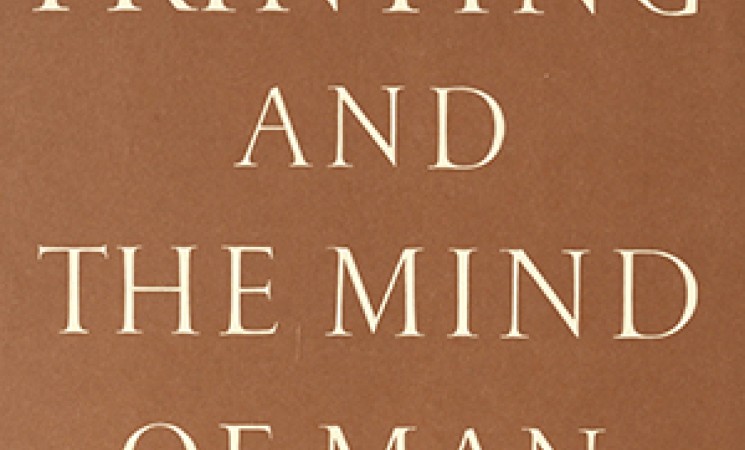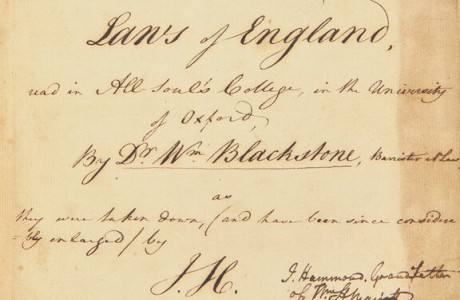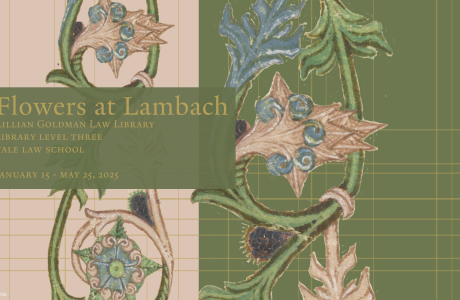Legal Literature's Greatest Hits

‘Tis the season for making lists. One popular way of taking stock of the past year is through lists of the year’s “greatest hits.” My colleague Fred Shapiro recently issued the 2018 edition of his annual list of most notable quotes, and lists of the year’s best (or worst) books and movies abound.
“All time greatest” lists are also popular and even useful pastimes. The book world is well supplied with such lists. Perhaps the most influential is Printing and the Mind of Man (2nd ed. 1983), which began as the catalogue of a 1963 exhibition in London. It has become a guide and yardstick for collectors.
For those who prefer round numbers for their lists, the Grolier Club has produced several “Grolier hundred” bibliographies, in conjunction with exhibitions, showcasing the 100 most famous books in fields including science, medicine, children’s literature, and English literature.
So what are legal literature’s greatest hits? We have a few lists to choose from. “Five books stand out pre-eminently in the history of English law,” wrote Sir William Holdsworth in Some Makers of English Law (1966):
- Ranulf de Glanvill, Tractatus de legibus et consuetudinibus regni Anglie (late 12th century, first print edition 1554)
- Henry de Bracton, De legibus & consuetudinibus Angliae (13th century; first print edition 1569)
- Thomas Littleton’s Tenures (1st ed. 1482)
- Sir Edward Coke, The first part of the Institutes of the lawes of England (1st ed. 1628)
- Sir William Blackstone, Commentaries on the Laws of England (1st ed. 1765-69)
For American law, we have the list of ten greatest American law books compiled by legal historian Bernard Schwartz in A Book of Legal Lists (1997):
- Alexander Hamilton, James Madison, John Jay, The Federalist (1788)
- James Kent, Commentaries on American Law (1826-30)
- Joseph Story, Commentaries on the Constitution of the United States (1833)
- Thomas M. Cooley, A Treatise on the Constitutional Limitations which Rest upon the Legislative Power of the American Union (1868)
- Christopher Columbus Langdell, A Selection of Cases on the Law of Contracts (1871)
- Oliver Wendell Holmes, The Common Law (1881)
- Benjamin N. Cardozo, The Nature of the Judicial Process (1921)
- Jerome N. Frank, Law and the Modern Mind (1930)
- James C. Carter, Law: Its Origin, Growth and Function (1907)
- Richard A. Posner, Economic Analysis of Law (1973)
The 424 entries in Printing and the Mind of Man (PMM) include nine law books:
- Justinian’s Institutes (1468), PMM 4
- Littleton’s Tenures (1482), PMM 23
- Bracton’s De legibus & consuetudinibus Angliae (1569), PMM 89
- Grotius’ De Jure Belli ac Pacis (1625), PMM 125
- Coke on Littleton (1628), PMM 126
- Montesquieu’s De l’Esprit des Loix (1748), PMM 197
- Beccaria’s Dei Delitti e delle Pene (1764), PMM 209
- Blackstone’s Commentaries (1765-69), PMM 212
- The Federalist (1788), PMM 234
The most wide ranging and comprehensive list I’ve seen is The Formation and Transmission of Western Legal Culture: 150 Books that Made the Law in the Age of Printing (Serge Dauchy et al. eds., 2016).
I find all of these lists interesting, useful (for teaching and for collection development), and unavoidably debatable. Their capacity for provoking debate is in fact one of their virtues. My primary objection to all these law lists is that they exclude tools such as law dictionaries and abridgments, practical literature such as form books, and legislative works such as the Code Napoleon, all of which have had enormous influence on the law, the law’s practitioners, and the law’s subjects. In addition, none of them venture outside the confines of western civilization.
In devising a new list, issues would include:
- Chronological limits.
- Geographic boundaries.
- Size. (I’m partial to 100).
- What constitutes a “book”? Does Magna Carta or the U.S. Constitution qualify?
- What constitutes a “law book”?
- Do we include codes or other legislative works?
- Do we include tools such as law dictionaries, abridgments, form books, or practice guides?
- What constitutes “great” or “influential”?
Finally, there is the question of who does the selection. I’m in favor of a mixed group of librarians, historians, collectors, and practitioners. If the discussion doesn’t produce a bibliography or an exhibition, it would at least be fun.
– MIKE WIDENER, Rare Book Librarian


